Bioethical Issues in Healthcare Management: An Extensive Review
VerifiedAdded on 2023/06/09
|10
|2416
|407
Literature Review
AI Summary
This literature review delves into the critical bioethical issues prevalent in contemporary healthcare management. It explores the meaning and significance of bioethics, highlighting its impact on healthcare practices and technological advancements. The review examines grounded ethical theories such as deontological and utilitarian ethics, along with key principles like autonomy, beneficence, nonmaleficence, and justice. It identifies common bioethical dilemmas faced by the healthcare industry, including end-of-life care, resource allocation, and organ donation. The review also touches upon the characteristics of ethical healthcare organizations and their culture. Ultimately, the review concludes by emphasizing the growing importance of bioethics in healthcare management while noting the limited research on measuring the importance of bioethical principles within organizations, suggesting potential avenues for future research.
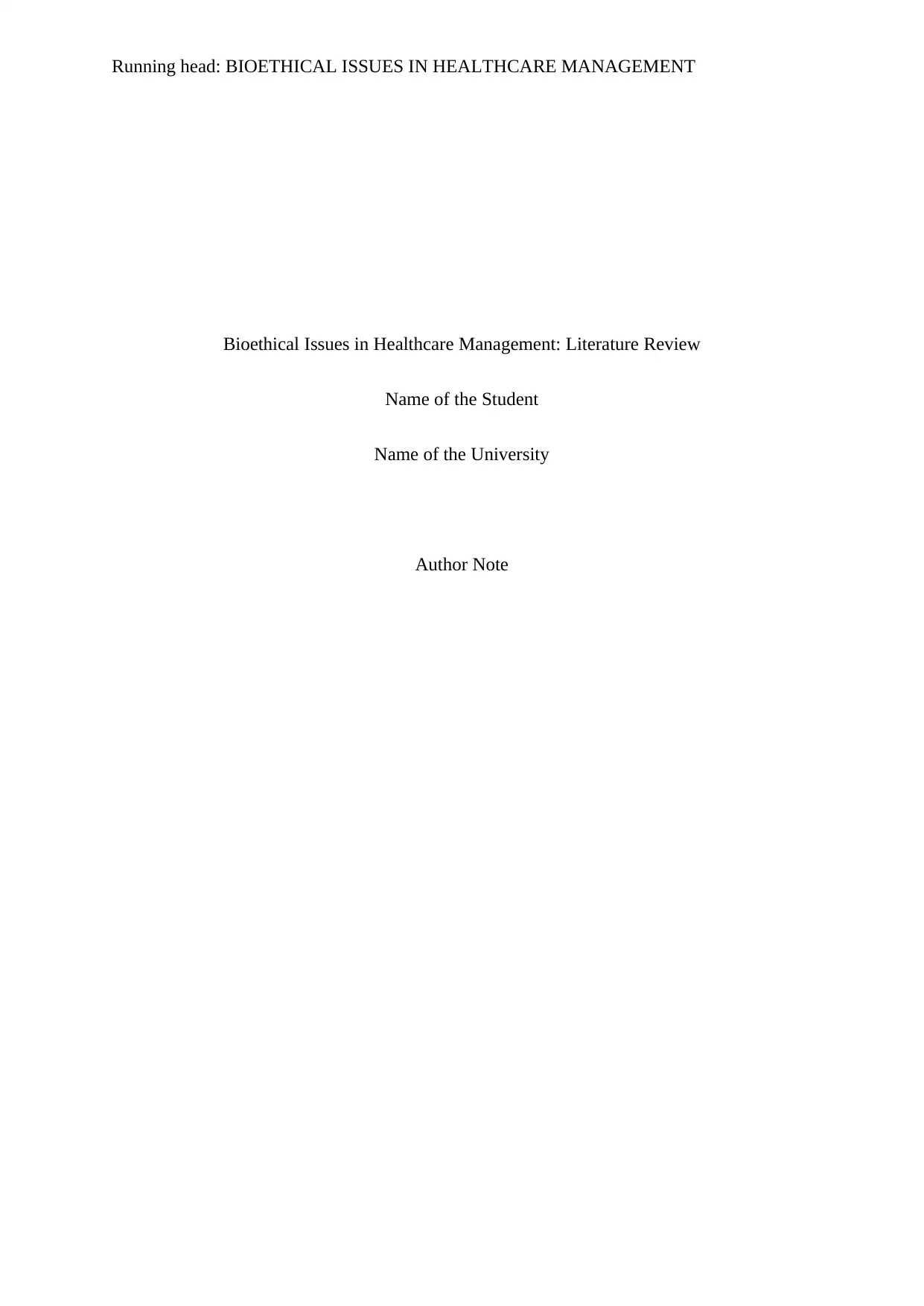
Running head: BIOETHICAL ISSUES IN HEALTHCARE MANAGEMENT
Bioethical Issues in Healthcare Management: Literature Review
Name of the Student
Name of the University
Author Note
Bioethical Issues in Healthcare Management: Literature Review
Name of the Student
Name of the University
Author Note
Paraphrase This Document
Need a fresh take? Get an instant paraphrase of this document with our AI Paraphraser
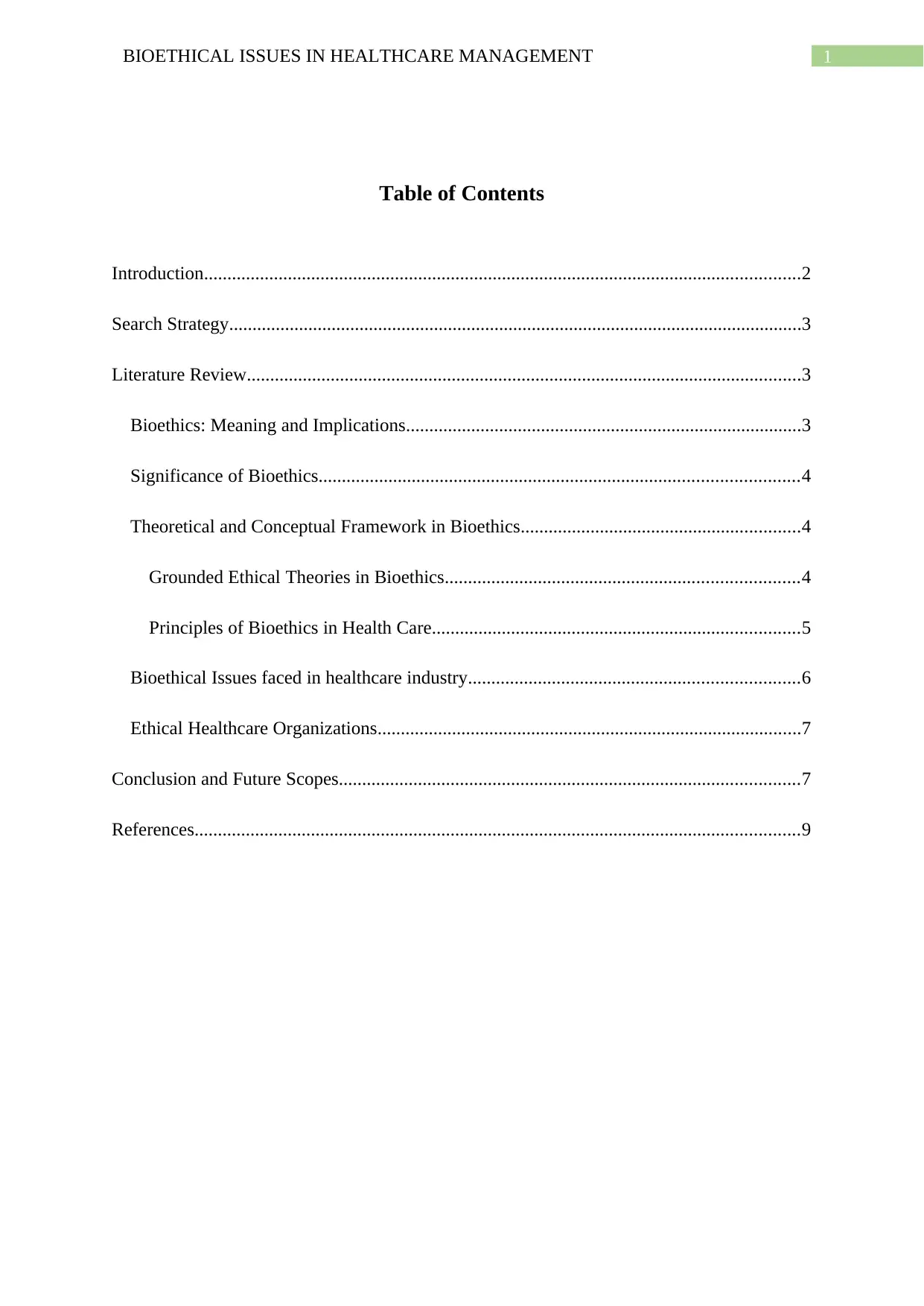
1BIOETHICAL ISSUES IN HEALTHCARE MANAGEMENT
Table of Contents
Introduction................................................................................................................................2
Search Strategy...........................................................................................................................3
Literature Review.......................................................................................................................3
Bioethics: Meaning and Implications.....................................................................................3
Significance of Bioethics.......................................................................................................4
Theoretical and Conceptual Framework in Bioethics............................................................4
Grounded Ethical Theories in Bioethics............................................................................4
Principles of Bioethics in Health Care...............................................................................5
Bioethical Issues faced in healthcare industry.......................................................................6
Ethical Healthcare Organizations...........................................................................................7
Conclusion and Future Scopes...................................................................................................7
References..................................................................................................................................9
Table of Contents
Introduction................................................................................................................................2
Search Strategy...........................................................................................................................3
Literature Review.......................................................................................................................3
Bioethics: Meaning and Implications.....................................................................................3
Significance of Bioethics.......................................................................................................4
Theoretical and Conceptual Framework in Bioethics............................................................4
Grounded Ethical Theories in Bioethics............................................................................4
Principles of Bioethics in Health Care...............................................................................5
Bioethical Issues faced in healthcare industry.......................................................................6
Ethical Healthcare Organizations...........................................................................................7
Conclusion and Future Scopes...................................................................................................7
References..................................................................................................................................9
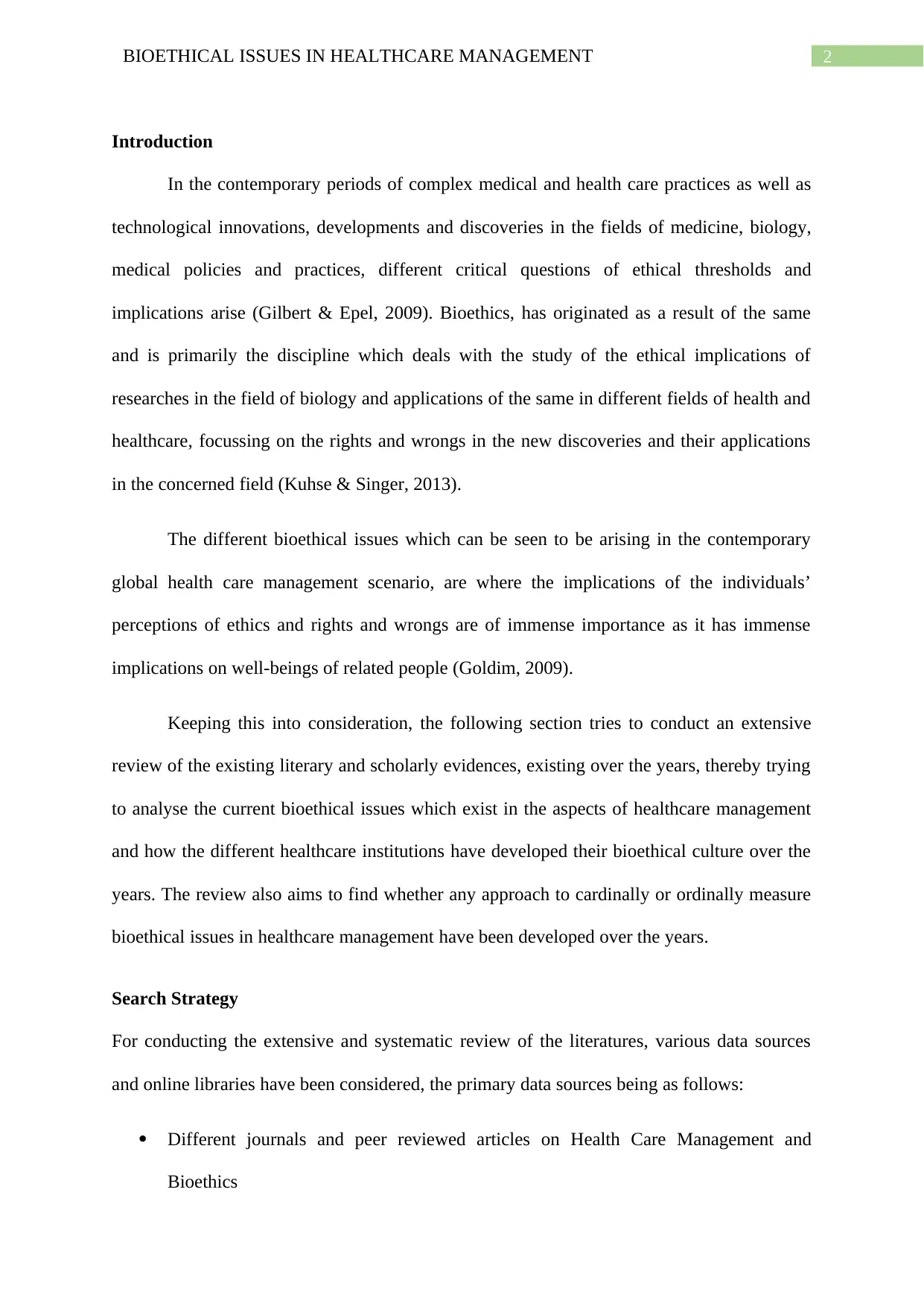
2BIOETHICAL ISSUES IN HEALTHCARE MANAGEMENT
Introduction
In the contemporary periods of complex medical and health care practices as well as
technological innovations, developments and discoveries in the fields of medicine, biology,
medical policies and practices, different critical questions of ethical thresholds and
implications arise (Gilbert & Epel, 2009). Bioethics, has originated as a result of the same
and is primarily the discipline which deals with the study of the ethical implications of
researches in the field of biology and applications of the same in different fields of health and
healthcare, focussing on the rights and wrongs in the new discoveries and their applications
in the concerned field (Kuhse & Singer, 2013).
The different bioethical issues which can be seen to be arising in the contemporary
global health care management scenario, are where the implications of the individuals’
perceptions of ethics and rights and wrongs are of immense importance as it has immense
implications on well-beings of related people (Goldim, 2009).
Keeping this into consideration, the following section tries to conduct an extensive
review of the existing literary and scholarly evidences, existing over the years, thereby trying
to analyse the current bioethical issues which exist in the aspects of healthcare management
and how the different healthcare institutions have developed their bioethical culture over the
years. The review also aims to find whether any approach to cardinally or ordinally measure
bioethical issues in healthcare management have been developed over the years.
Search Strategy
For conducting the extensive and systematic review of the literatures, various data sources
and online libraries have been considered, the primary data sources being as follows:
Different journals and peer reviewed articles on Health Care Management and
Bioethics
Introduction
In the contemporary periods of complex medical and health care practices as well as
technological innovations, developments and discoveries in the fields of medicine, biology,
medical policies and practices, different critical questions of ethical thresholds and
implications arise (Gilbert & Epel, 2009). Bioethics, has originated as a result of the same
and is primarily the discipline which deals with the study of the ethical implications of
researches in the field of biology and applications of the same in different fields of health and
healthcare, focussing on the rights and wrongs in the new discoveries and their applications
in the concerned field (Kuhse & Singer, 2013).
The different bioethical issues which can be seen to be arising in the contemporary
global health care management scenario, are where the implications of the individuals’
perceptions of ethics and rights and wrongs are of immense importance as it has immense
implications on well-beings of related people (Goldim, 2009).
Keeping this into consideration, the following section tries to conduct an extensive
review of the existing literary and scholarly evidences, existing over the years, thereby trying
to analyse the current bioethical issues which exist in the aspects of healthcare management
and how the different healthcare institutions have developed their bioethical culture over the
years. The review also aims to find whether any approach to cardinally or ordinally measure
bioethical issues in healthcare management have been developed over the years.
Search Strategy
For conducting the extensive and systematic review of the literatures, various data sources
and online libraries have been considered, the primary data sources being as follows:
Different journals and peer reviewed articles on Health Care Management and
Bioethics
⊘ This is a preview!⊘
Do you want full access?
Subscribe today to unlock all pages.

Trusted by 1+ million students worldwide
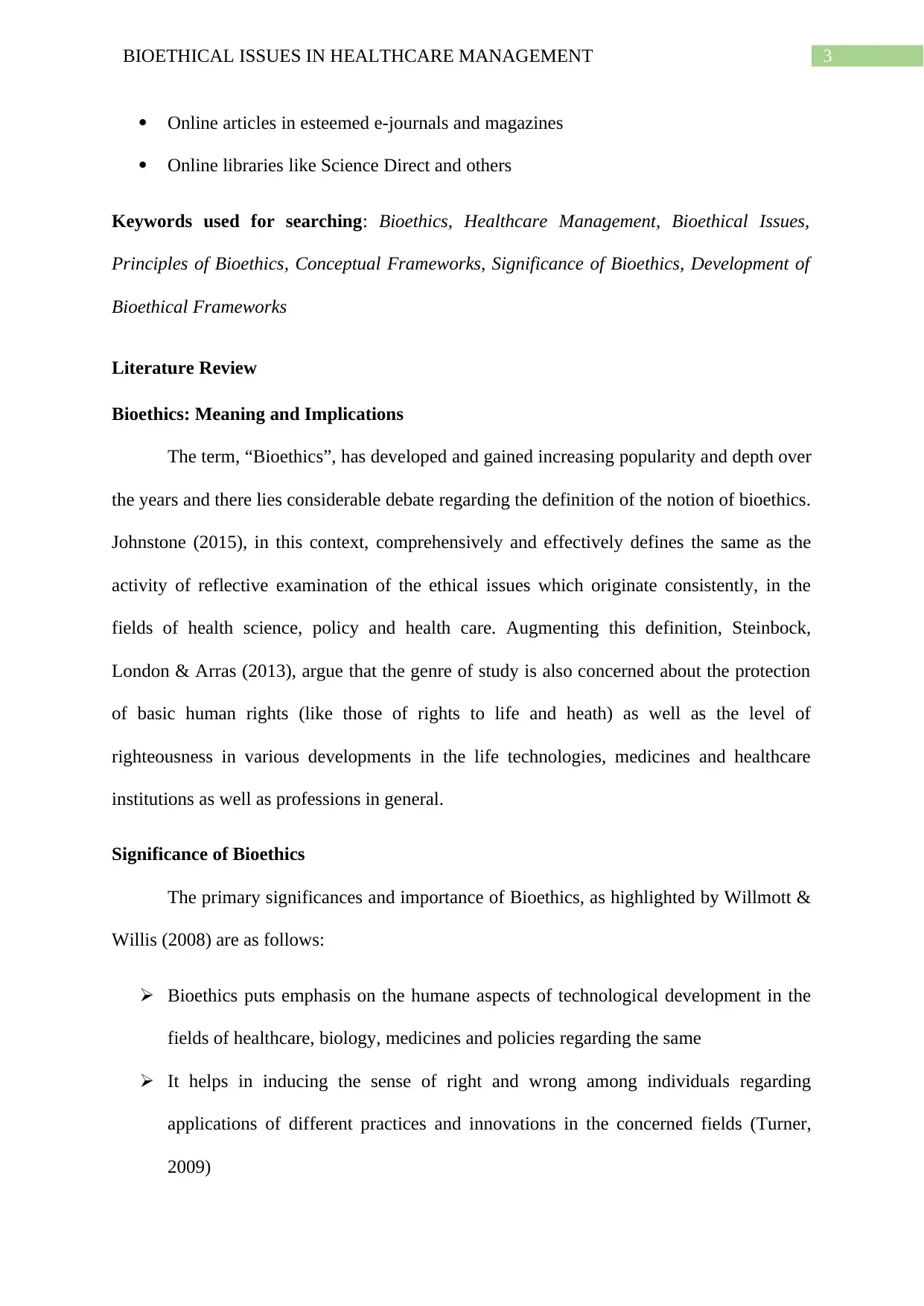
3BIOETHICAL ISSUES IN HEALTHCARE MANAGEMENT
Online articles in esteemed e-journals and magazines
Online libraries like Science Direct and others
Keywords used for searching: Bioethics, Healthcare Management, Bioethical Issues,
Principles of Bioethics, Conceptual Frameworks, Significance of Bioethics, Development of
Bioethical Frameworks
Literature Review
Bioethics: Meaning and Implications
The term, “Bioethics”, has developed and gained increasing popularity and depth over
the years and there lies considerable debate regarding the definition of the notion of bioethics.
Johnstone (2015), in this context, comprehensively and effectively defines the same as the
activity of reflective examination of the ethical issues which originate consistently, in the
fields of health science, policy and health care. Augmenting this definition, Steinbock,
London & Arras (2013), argue that the genre of study is also concerned about the protection
of basic human rights (like those of rights to life and heath) as well as the level of
righteousness in various developments in the life technologies, medicines and healthcare
institutions as well as professions in general.
Significance of Bioethics
The primary significances and importance of Bioethics, as highlighted by Willmott &
Willis (2008) are as follows:
Bioethics puts emphasis on the humane aspects of technological development in the
fields of healthcare, biology, medicines and policies regarding the same
It helps in inducing the sense of right and wrong among individuals regarding
applications of different practices and innovations in the concerned fields (Turner,
2009)
Online articles in esteemed e-journals and magazines
Online libraries like Science Direct and others
Keywords used for searching: Bioethics, Healthcare Management, Bioethical Issues,
Principles of Bioethics, Conceptual Frameworks, Significance of Bioethics, Development of
Bioethical Frameworks
Literature Review
Bioethics: Meaning and Implications
The term, “Bioethics”, has developed and gained increasing popularity and depth over
the years and there lies considerable debate regarding the definition of the notion of bioethics.
Johnstone (2015), in this context, comprehensively and effectively defines the same as the
activity of reflective examination of the ethical issues which originate consistently, in the
fields of health science, policy and health care. Augmenting this definition, Steinbock,
London & Arras (2013), argue that the genre of study is also concerned about the protection
of basic human rights (like those of rights to life and heath) as well as the level of
righteousness in various developments in the life technologies, medicines and healthcare
institutions as well as professions in general.
Significance of Bioethics
The primary significances and importance of Bioethics, as highlighted by Willmott &
Willis (2008) are as follows:
Bioethics puts emphasis on the humane aspects of technological development in the
fields of healthcare, biology, medicines and policies regarding the same
It helps in inducing the sense of right and wrong among individuals regarding
applications of different practices and innovations in the concerned fields (Turner,
2009)
Paraphrase This Document
Need a fresh take? Get an instant paraphrase of this document with our AI Paraphraser
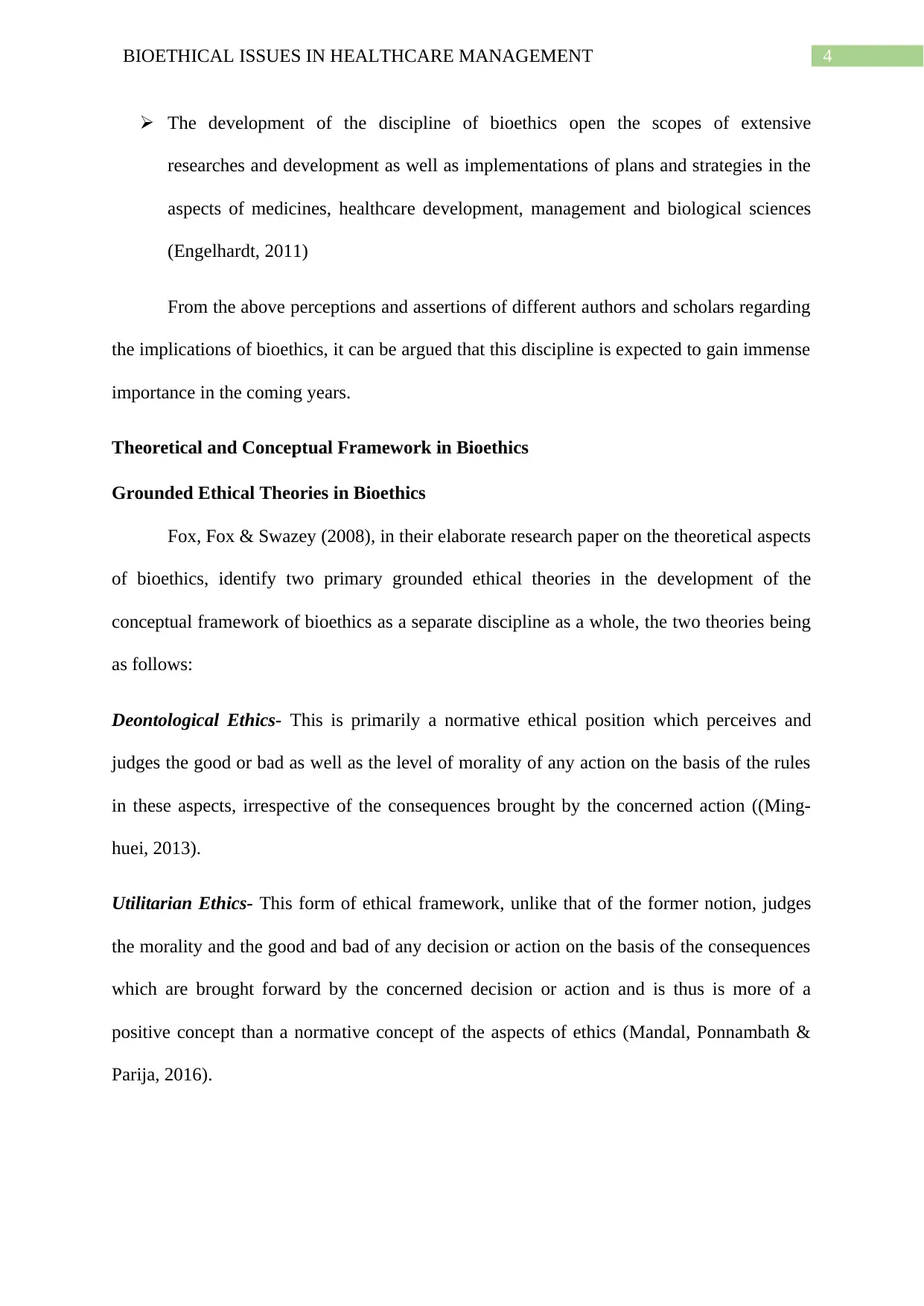
4BIOETHICAL ISSUES IN HEALTHCARE MANAGEMENT
The development of the discipline of bioethics open the scopes of extensive
researches and development as well as implementations of plans and strategies in the
aspects of medicines, healthcare development, management and biological sciences
(Engelhardt, 2011)
From the above perceptions and assertions of different authors and scholars regarding
the implications of bioethics, it can be argued that this discipline is expected to gain immense
importance in the coming years.
Theoretical and Conceptual Framework in Bioethics
Grounded Ethical Theories in Bioethics
Fox, Fox & Swazey (2008), in their elaborate research paper on the theoretical aspects
of bioethics, identify two primary grounded ethical theories in the development of the
conceptual framework of bioethics as a separate discipline as a whole, the two theories being
as follows:
Deontological Ethics- This is primarily a normative ethical position which perceives and
judges the good or bad as well as the level of morality of any action on the basis of the rules
in these aspects, irrespective of the consequences brought by the concerned action ((Ming-
huei, 2013).
Utilitarian Ethics- This form of ethical framework, unlike that of the former notion, judges
the morality and the good and bad of any decision or action on the basis of the consequences
which are brought forward by the concerned decision or action and is thus is more of a
positive concept than a normative concept of the aspects of ethics (Mandal, Ponnambath &
Parija, 2016).
The development of the discipline of bioethics open the scopes of extensive
researches and development as well as implementations of plans and strategies in the
aspects of medicines, healthcare development, management and biological sciences
(Engelhardt, 2011)
From the above perceptions and assertions of different authors and scholars regarding
the implications of bioethics, it can be argued that this discipline is expected to gain immense
importance in the coming years.
Theoretical and Conceptual Framework in Bioethics
Grounded Ethical Theories in Bioethics
Fox, Fox & Swazey (2008), in their elaborate research paper on the theoretical aspects
of bioethics, identify two primary grounded ethical theories in the development of the
conceptual framework of bioethics as a separate discipline as a whole, the two theories being
as follows:
Deontological Ethics- This is primarily a normative ethical position which perceives and
judges the good or bad as well as the level of morality of any action on the basis of the rules
in these aspects, irrespective of the consequences brought by the concerned action ((Ming-
huei, 2013).
Utilitarian Ethics- This form of ethical framework, unlike that of the former notion, judges
the morality and the good and bad of any decision or action on the basis of the consequences
which are brought forward by the concerned decision or action and is thus is more of a
positive concept than a normative concept of the aspects of ethics (Mandal, Ponnambath &
Parija, 2016).
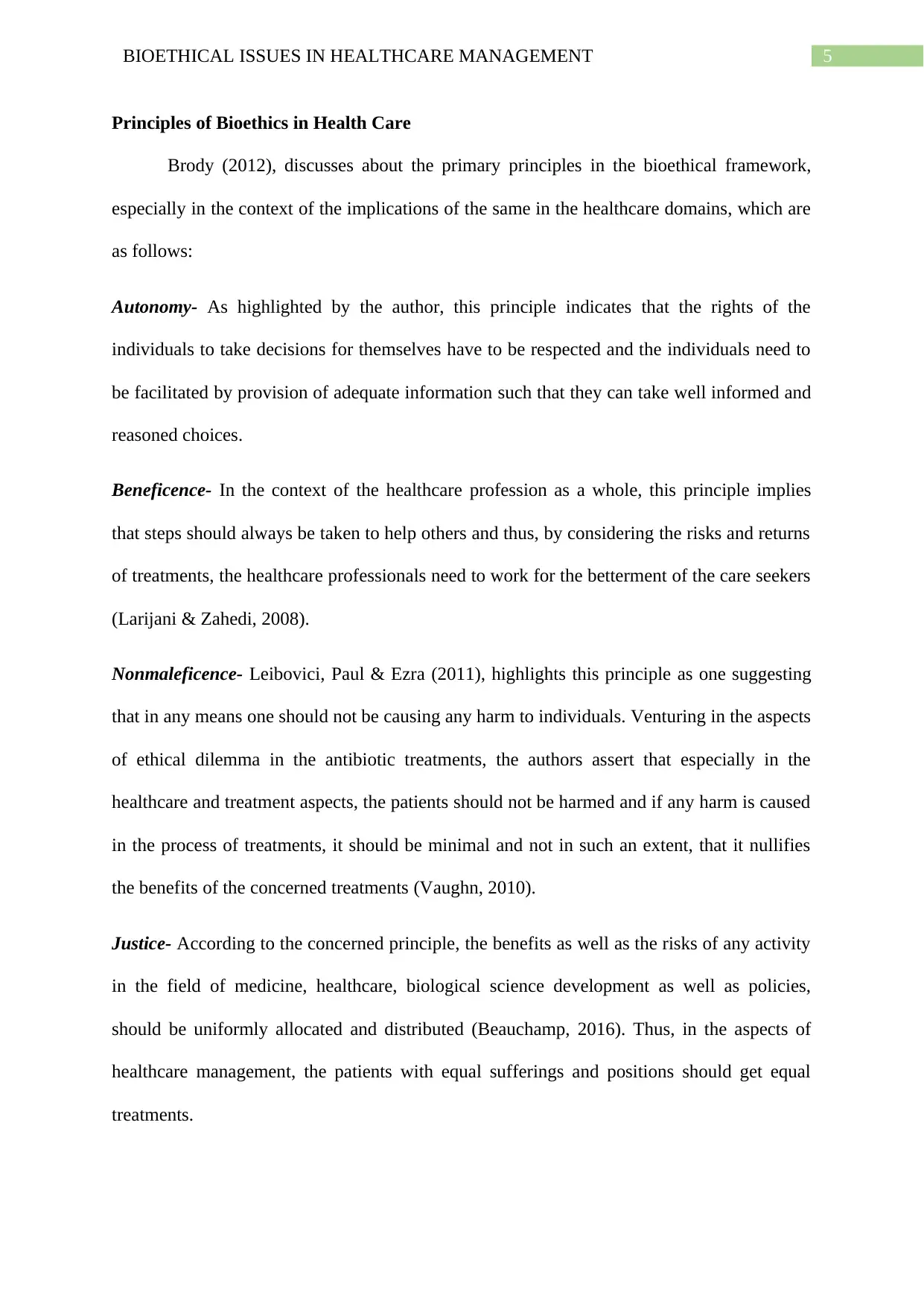
5BIOETHICAL ISSUES IN HEALTHCARE MANAGEMENT
Principles of Bioethics in Health Care
Brody (2012), discusses about the primary principles in the bioethical framework,
especially in the context of the implications of the same in the healthcare domains, which are
as follows:
Autonomy- As highlighted by the author, this principle indicates that the rights of the
individuals to take decisions for themselves have to be respected and the individuals need to
be facilitated by provision of adequate information such that they can take well informed and
reasoned choices.
Beneficence- In the context of the healthcare profession as a whole, this principle implies
that steps should always be taken to help others and thus, by considering the risks and returns
of treatments, the healthcare professionals need to work for the betterment of the care seekers
(Larijani & Zahedi, 2008).
Nonmaleficence- Leibovici, Paul & Ezra (2011), highlights this principle as one suggesting
that in any means one should not be causing any harm to individuals. Venturing in the aspects
of ethical dilemma in the antibiotic treatments, the authors assert that especially in the
healthcare and treatment aspects, the patients should not be harmed and if any harm is caused
in the process of treatments, it should be minimal and not in such an extent, that it nullifies
the benefits of the concerned treatments (Vaughn, 2010).
Justice- According to the concerned principle, the benefits as well as the risks of any activity
in the field of medicine, healthcare, biological science development as well as policies,
should be uniformly allocated and distributed (Beauchamp, 2016). Thus, in the aspects of
healthcare management, the patients with equal sufferings and positions should get equal
treatments.
Principles of Bioethics in Health Care
Brody (2012), discusses about the primary principles in the bioethical framework,
especially in the context of the implications of the same in the healthcare domains, which are
as follows:
Autonomy- As highlighted by the author, this principle indicates that the rights of the
individuals to take decisions for themselves have to be respected and the individuals need to
be facilitated by provision of adequate information such that they can take well informed and
reasoned choices.
Beneficence- In the context of the healthcare profession as a whole, this principle implies
that steps should always be taken to help others and thus, by considering the risks and returns
of treatments, the healthcare professionals need to work for the betterment of the care seekers
(Larijani & Zahedi, 2008).
Nonmaleficence- Leibovici, Paul & Ezra (2011), highlights this principle as one suggesting
that in any means one should not be causing any harm to individuals. Venturing in the aspects
of ethical dilemma in the antibiotic treatments, the authors assert that especially in the
healthcare and treatment aspects, the patients should not be harmed and if any harm is caused
in the process of treatments, it should be minimal and not in such an extent, that it nullifies
the benefits of the concerned treatments (Vaughn, 2010).
Justice- According to the concerned principle, the benefits as well as the risks of any activity
in the field of medicine, healthcare, biological science development as well as policies,
should be uniformly allocated and distributed (Beauchamp, 2016). Thus, in the aspects of
healthcare management, the patients with equal sufferings and positions should get equal
treatments.
⊘ This is a preview!⊘
Do you want full access?
Subscribe today to unlock all pages.

Trusted by 1+ million students worldwide
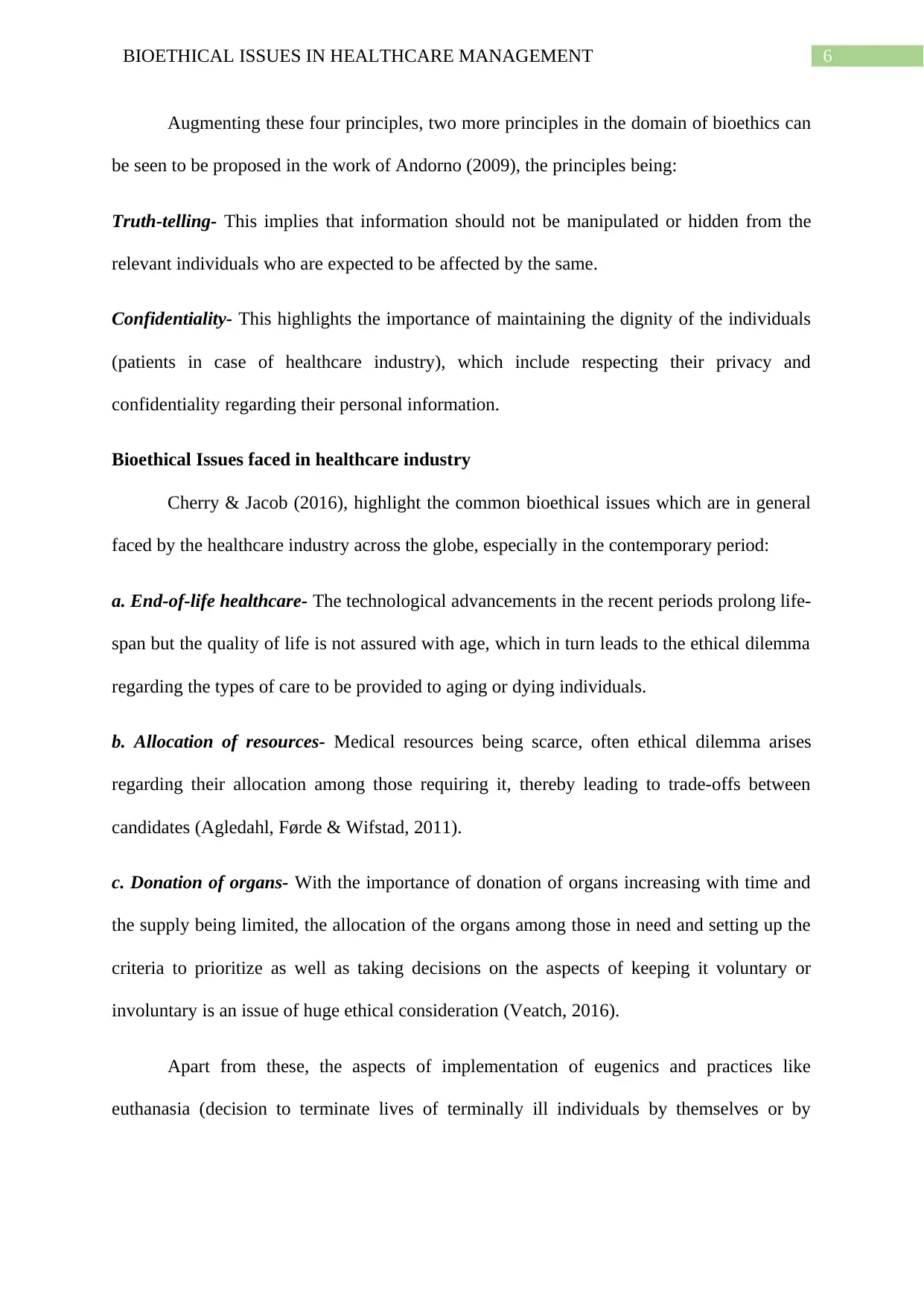
6BIOETHICAL ISSUES IN HEALTHCARE MANAGEMENT
Augmenting these four principles, two more principles in the domain of bioethics can
be seen to be proposed in the work of Andorno (2009), the principles being:
Truth-telling- This implies that information should not be manipulated or hidden from the
relevant individuals who are expected to be affected by the same.
Confidentiality- This highlights the importance of maintaining the dignity of the individuals
(patients in case of healthcare industry), which include respecting their privacy and
confidentiality regarding their personal information.
Bioethical Issues faced in healthcare industry
Cherry & Jacob (2016), highlight the common bioethical issues which are in general
faced by the healthcare industry across the globe, especially in the contemporary period:
a. End-of-life healthcare- The technological advancements in the recent periods prolong life-
span but the quality of life is not assured with age, which in turn leads to the ethical dilemma
regarding the types of care to be provided to aging or dying individuals.
b. Allocation of resources- Medical resources being scarce, often ethical dilemma arises
regarding their allocation among those requiring it, thereby leading to trade-offs between
candidates (Agledahl, Førde & Wifstad, 2011).
c. Donation of organs- With the importance of donation of organs increasing with time and
the supply being limited, the allocation of the organs among those in need and setting up the
criteria to prioritize as well as taking decisions on the aspects of keeping it voluntary or
involuntary is an issue of huge ethical consideration (Veatch, 2016).
Apart from these, the aspects of implementation of eugenics and practices like
euthanasia (decision to terminate lives of terminally ill individuals by themselves or by
Augmenting these four principles, two more principles in the domain of bioethics can
be seen to be proposed in the work of Andorno (2009), the principles being:
Truth-telling- This implies that information should not be manipulated or hidden from the
relevant individuals who are expected to be affected by the same.
Confidentiality- This highlights the importance of maintaining the dignity of the individuals
(patients in case of healthcare industry), which include respecting their privacy and
confidentiality regarding their personal information.
Bioethical Issues faced in healthcare industry
Cherry & Jacob (2016), highlight the common bioethical issues which are in general
faced by the healthcare industry across the globe, especially in the contemporary period:
a. End-of-life healthcare- The technological advancements in the recent periods prolong life-
span but the quality of life is not assured with age, which in turn leads to the ethical dilemma
regarding the types of care to be provided to aging or dying individuals.
b. Allocation of resources- Medical resources being scarce, often ethical dilemma arises
regarding their allocation among those requiring it, thereby leading to trade-offs between
candidates (Agledahl, Førde & Wifstad, 2011).
c. Donation of organs- With the importance of donation of organs increasing with time and
the supply being limited, the allocation of the organs among those in need and setting up the
criteria to prioritize as well as taking decisions on the aspects of keeping it voluntary or
involuntary is an issue of huge ethical consideration (Veatch, 2016).
Apart from these, the aspects of implementation of eugenics and practices like
euthanasia (decision to terminate lives of terminally ill individuals by themselves or by
Paraphrase This Document
Need a fresh take? Get an instant paraphrase of this document with our AI Paraphraser
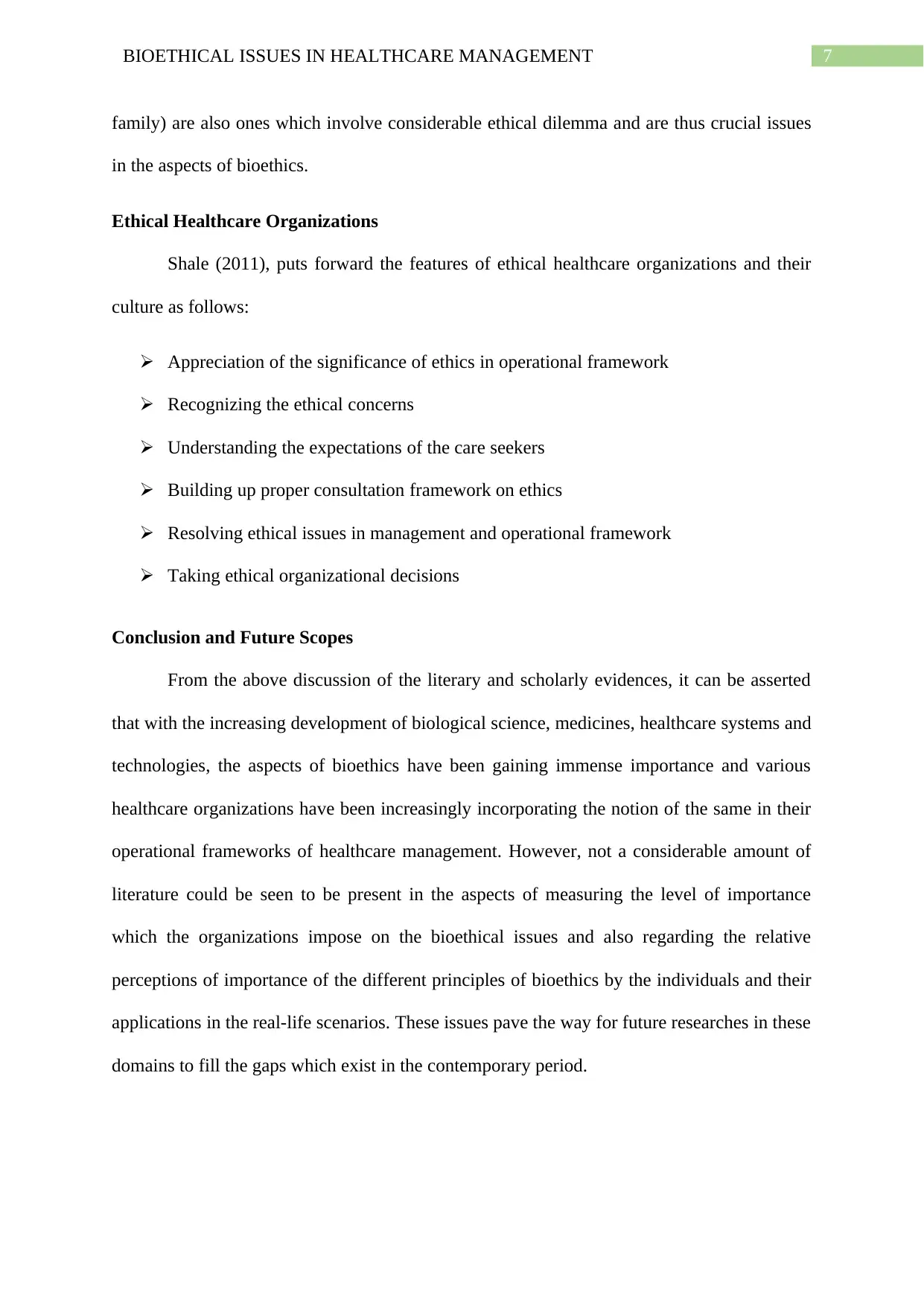
7BIOETHICAL ISSUES IN HEALTHCARE MANAGEMENT
family) are also ones which involve considerable ethical dilemma and are thus crucial issues
in the aspects of bioethics.
Ethical Healthcare Organizations
Shale (2011), puts forward the features of ethical healthcare organizations and their
culture as follows:
Appreciation of the significance of ethics in operational framework
Recognizing the ethical concerns
Understanding the expectations of the care seekers
Building up proper consultation framework on ethics
Resolving ethical issues in management and operational framework
Taking ethical organizational decisions
Conclusion and Future Scopes
From the above discussion of the literary and scholarly evidences, it can be asserted
that with the increasing development of biological science, medicines, healthcare systems and
technologies, the aspects of bioethics have been gaining immense importance and various
healthcare organizations have been increasingly incorporating the notion of the same in their
operational frameworks of healthcare management. However, not a considerable amount of
literature could be seen to be present in the aspects of measuring the level of importance
which the organizations impose on the bioethical issues and also regarding the relative
perceptions of importance of the different principles of bioethics by the individuals and their
applications in the real-life scenarios. These issues pave the way for future researches in these
domains to fill the gaps which exist in the contemporary period.
family) are also ones which involve considerable ethical dilemma and are thus crucial issues
in the aspects of bioethics.
Ethical Healthcare Organizations
Shale (2011), puts forward the features of ethical healthcare organizations and their
culture as follows:
Appreciation of the significance of ethics in operational framework
Recognizing the ethical concerns
Understanding the expectations of the care seekers
Building up proper consultation framework on ethics
Resolving ethical issues in management and operational framework
Taking ethical organizational decisions
Conclusion and Future Scopes
From the above discussion of the literary and scholarly evidences, it can be asserted
that with the increasing development of biological science, medicines, healthcare systems and
technologies, the aspects of bioethics have been gaining immense importance and various
healthcare organizations have been increasingly incorporating the notion of the same in their
operational frameworks of healthcare management. However, not a considerable amount of
literature could be seen to be present in the aspects of measuring the level of importance
which the organizations impose on the bioethical issues and also regarding the relative
perceptions of importance of the different principles of bioethics by the individuals and their
applications in the real-life scenarios. These issues pave the way for future researches in these
domains to fill the gaps which exist in the contemporary period.
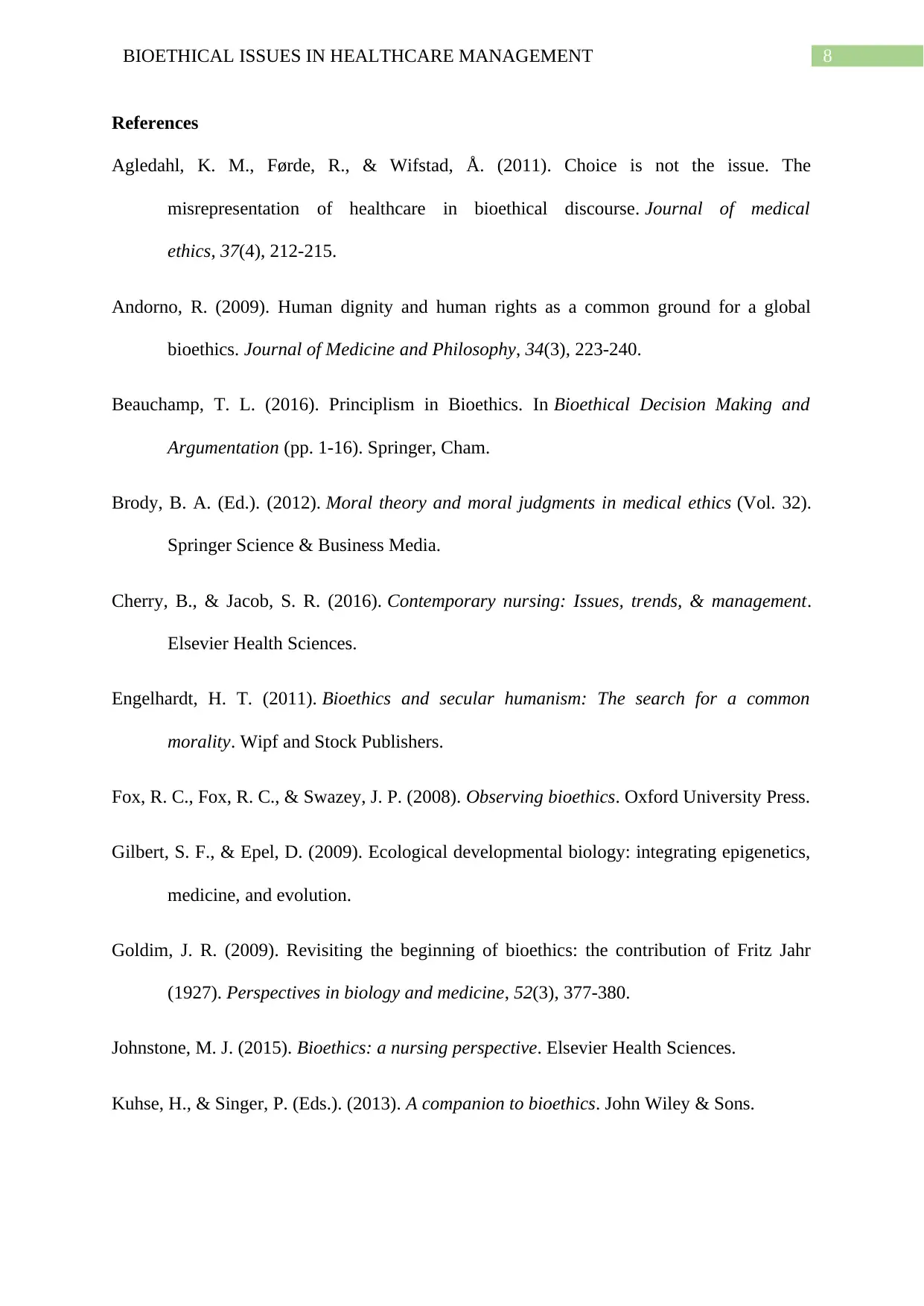
8BIOETHICAL ISSUES IN HEALTHCARE MANAGEMENT
References
Agledahl, K. M., Førde, R., & Wifstad, Å. (2011). Choice is not the issue. The
misrepresentation of healthcare in bioethical discourse. Journal of medical
ethics, 37(4), 212-215.
Andorno, R. (2009). Human dignity and human rights as a common ground for a global
bioethics. Journal of Medicine and Philosophy, 34(3), 223-240.
Beauchamp, T. L. (2016). Principlism in Bioethics. In Bioethical Decision Making and
Argumentation (pp. 1-16). Springer, Cham.
Brody, B. A. (Ed.). (2012). Moral theory and moral judgments in medical ethics (Vol. 32).
Springer Science & Business Media.
Cherry, B., & Jacob, S. R. (2016). Contemporary nursing: Issues, trends, & management.
Elsevier Health Sciences.
Engelhardt, H. T. (2011). Bioethics and secular humanism: The search for a common
morality. Wipf and Stock Publishers.
Fox, R. C., Fox, R. C., & Swazey, J. P. (2008). Observing bioethics. Oxford University Press.
Gilbert, S. F., & Epel, D. (2009). Ecological developmental biology: integrating epigenetics,
medicine, and evolution.
Goldim, J. R. (2009). Revisiting the beginning of bioethics: the contribution of Fritz Jahr
(1927). Perspectives in biology and medicine, 52(3), 377-380.
Johnstone, M. J. (2015). Bioethics: a nursing perspective. Elsevier Health Sciences.
Kuhse, H., & Singer, P. (Eds.). (2013). A companion to bioethics. John Wiley & Sons.
References
Agledahl, K. M., Førde, R., & Wifstad, Å. (2011). Choice is not the issue. The
misrepresentation of healthcare in bioethical discourse. Journal of medical
ethics, 37(4), 212-215.
Andorno, R. (2009). Human dignity and human rights as a common ground for a global
bioethics. Journal of Medicine and Philosophy, 34(3), 223-240.
Beauchamp, T. L. (2016). Principlism in Bioethics. In Bioethical Decision Making and
Argumentation (pp. 1-16). Springer, Cham.
Brody, B. A. (Ed.). (2012). Moral theory and moral judgments in medical ethics (Vol. 32).
Springer Science & Business Media.
Cherry, B., & Jacob, S. R. (2016). Contemporary nursing: Issues, trends, & management.
Elsevier Health Sciences.
Engelhardt, H. T. (2011). Bioethics and secular humanism: The search for a common
morality. Wipf and Stock Publishers.
Fox, R. C., Fox, R. C., & Swazey, J. P. (2008). Observing bioethics. Oxford University Press.
Gilbert, S. F., & Epel, D. (2009). Ecological developmental biology: integrating epigenetics,
medicine, and evolution.
Goldim, J. R. (2009). Revisiting the beginning of bioethics: the contribution of Fritz Jahr
(1927). Perspectives in biology and medicine, 52(3), 377-380.
Johnstone, M. J. (2015). Bioethics: a nursing perspective. Elsevier Health Sciences.
Kuhse, H., & Singer, P. (Eds.). (2013). A companion to bioethics. John Wiley & Sons.
⊘ This is a preview!⊘
Do you want full access?
Subscribe today to unlock all pages.

Trusted by 1+ million students worldwide
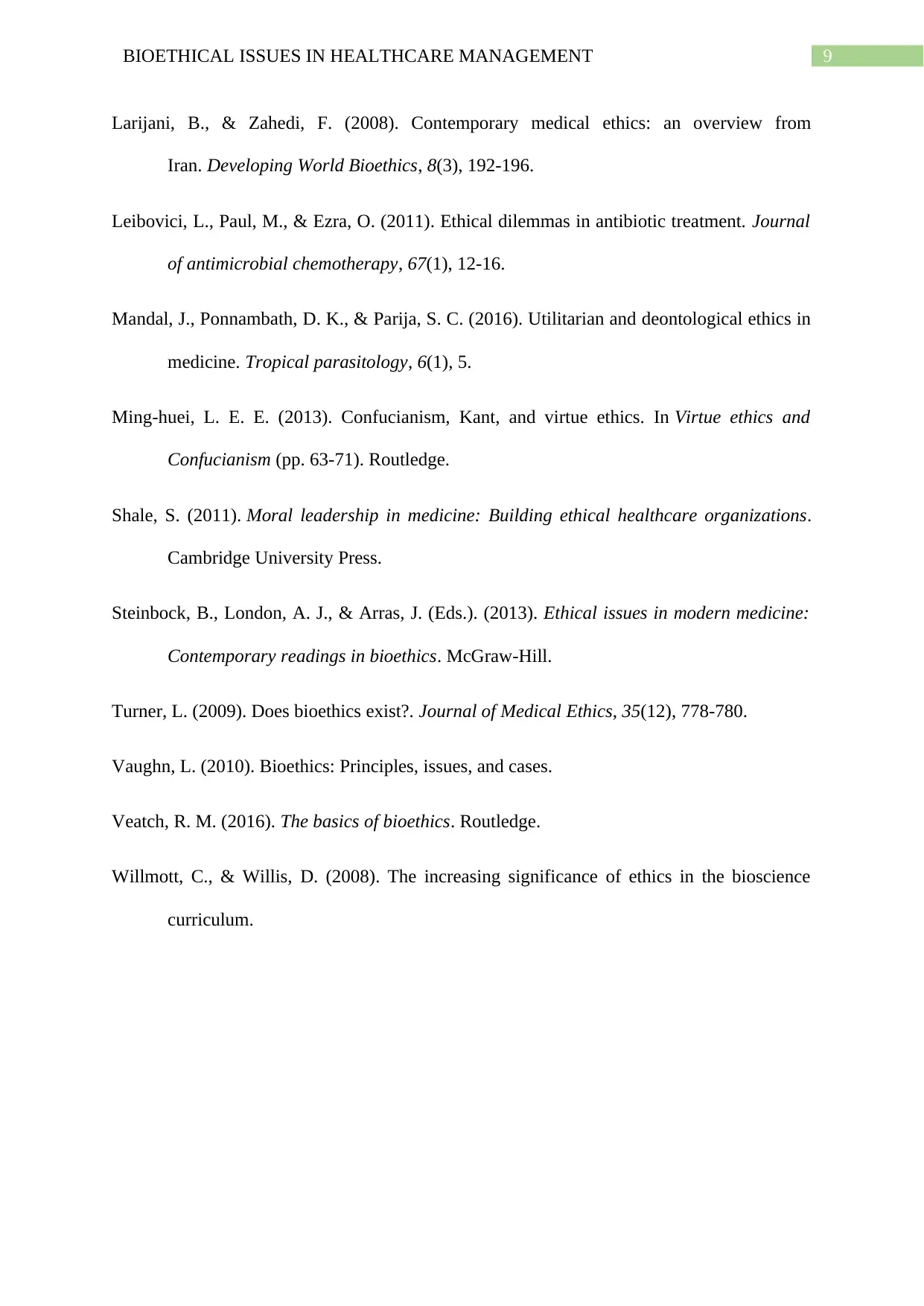
9BIOETHICAL ISSUES IN HEALTHCARE MANAGEMENT
Larijani, B., & Zahedi, F. (2008). Contemporary medical ethics: an overview from
Iran. Developing World Bioethics, 8(3), 192-196.
Leibovici, L., Paul, M., & Ezra, O. (2011). Ethical dilemmas in antibiotic treatment. Journal
of antimicrobial chemotherapy, 67(1), 12-16.
Mandal, J., Ponnambath, D. K., & Parija, S. C. (2016). Utilitarian and deontological ethics in
medicine. Tropical parasitology, 6(1), 5.
Ming-huei, L. E. E. (2013). Confucianism, Kant, and virtue ethics. In Virtue ethics and
Confucianism (pp. 63-71). Routledge.
Shale, S. (2011). Moral leadership in medicine: Building ethical healthcare organizations.
Cambridge University Press.
Steinbock, B., London, A. J., & Arras, J. (Eds.). (2013). Ethical issues in modern medicine:
Contemporary readings in bioethics. McGraw-Hill.
Turner, L. (2009). Does bioethics exist?. Journal of Medical Ethics, 35(12), 778-780.
Vaughn, L. (2010). Bioethics: Principles, issues, and cases.
Veatch, R. M. (2016). The basics of bioethics. Routledge.
Willmott, C., & Willis, D. (2008). The increasing significance of ethics in the bioscience
curriculum.
Larijani, B., & Zahedi, F. (2008). Contemporary medical ethics: an overview from
Iran. Developing World Bioethics, 8(3), 192-196.
Leibovici, L., Paul, M., & Ezra, O. (2011). Ethical dilemmas in antibiotic treatment. Journal
of antimicrobial chemotherapy, 67(1), 12-16.
Mandal, J., Ponnambath, D. K., & Parija, S. C. (2016). Utilitarian and deontological ethics in
medicine. Tropical parasitology, 6(1), 5.
Ming-huei, L. E. E. (2013). Confucianism, Kant, and virtue ethics. In Virtue ethics and
Confucianism (pp. 63-71). Routledge.
Shale, S. (2011). Moral leadership in medicine: Building ethical healthcare organizations.
Cambridge University Press.
Steinbock, B., London, A. J., & Arras, J. (Eds.). (2013). Ethical issues in modern medicine:
Contemporary readings in bioethics. McGraw-Hill.
Turner, L. (2009). Does bioethics exist?. Journal of Medical Ethics, 35(12), 778-780.
Vaughn, L. (2010). Bioethics: Principles, issues, and cases.
Veatch, R. M. (2016). The basics of bioethics. Routledge.
Willmott, C., & Willis, D. (2008). The increasing significance of ethics in the bioscience
curriculum.
1 out of 10
Related Documents
Your All-in-One AI-Powered Toolkit for Academic Success.
+13062052269
info@desklib.com
Available 24*7 on WhatsApp / Email
![[object Object]](/_next/static/media/star-bottom.7253800d.svg)
Unlock your academic potential
Copyright © 2020–2026 A2Z Services. All Rights Reserved. Developed and managed by ZUCOL.





